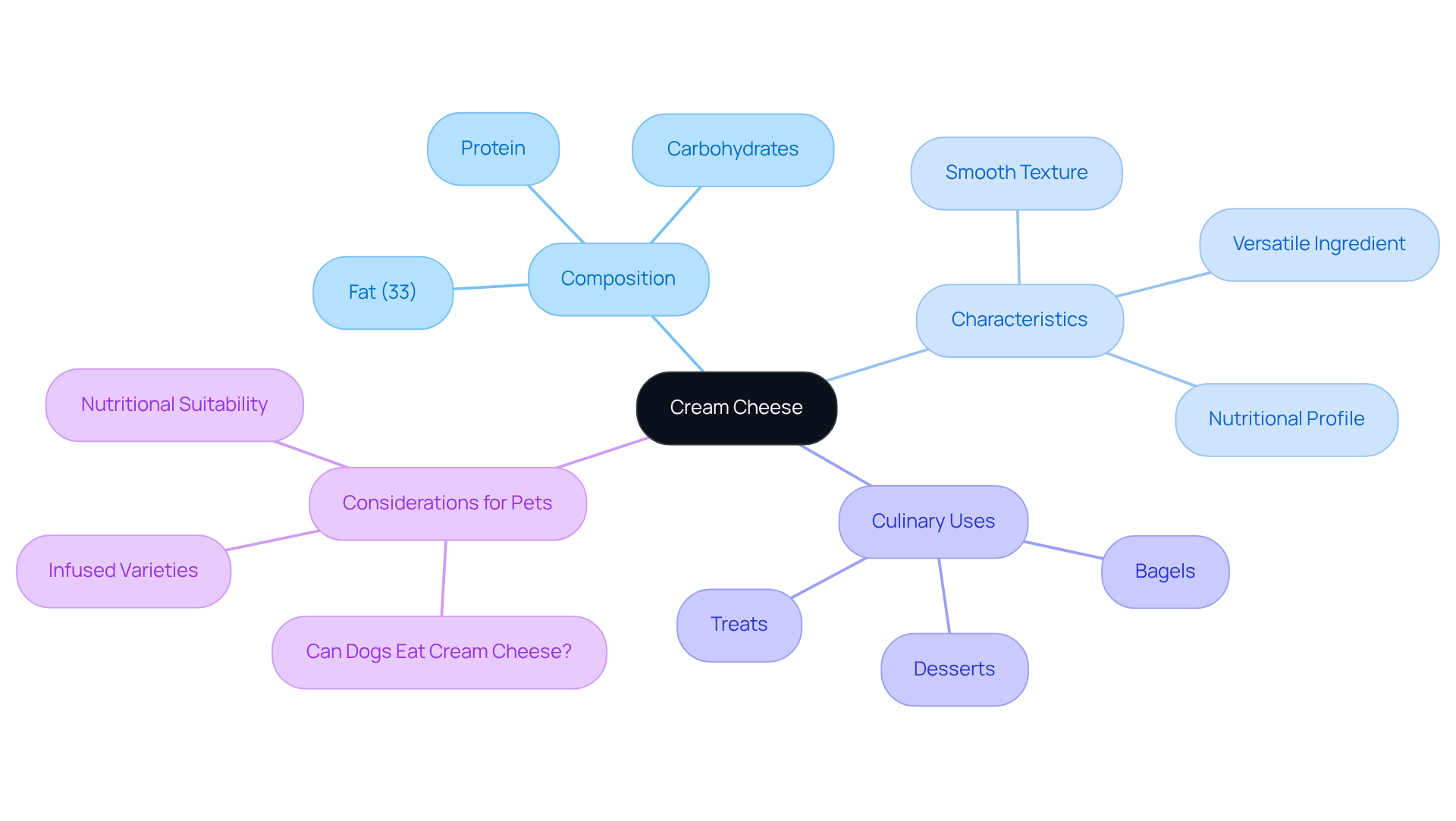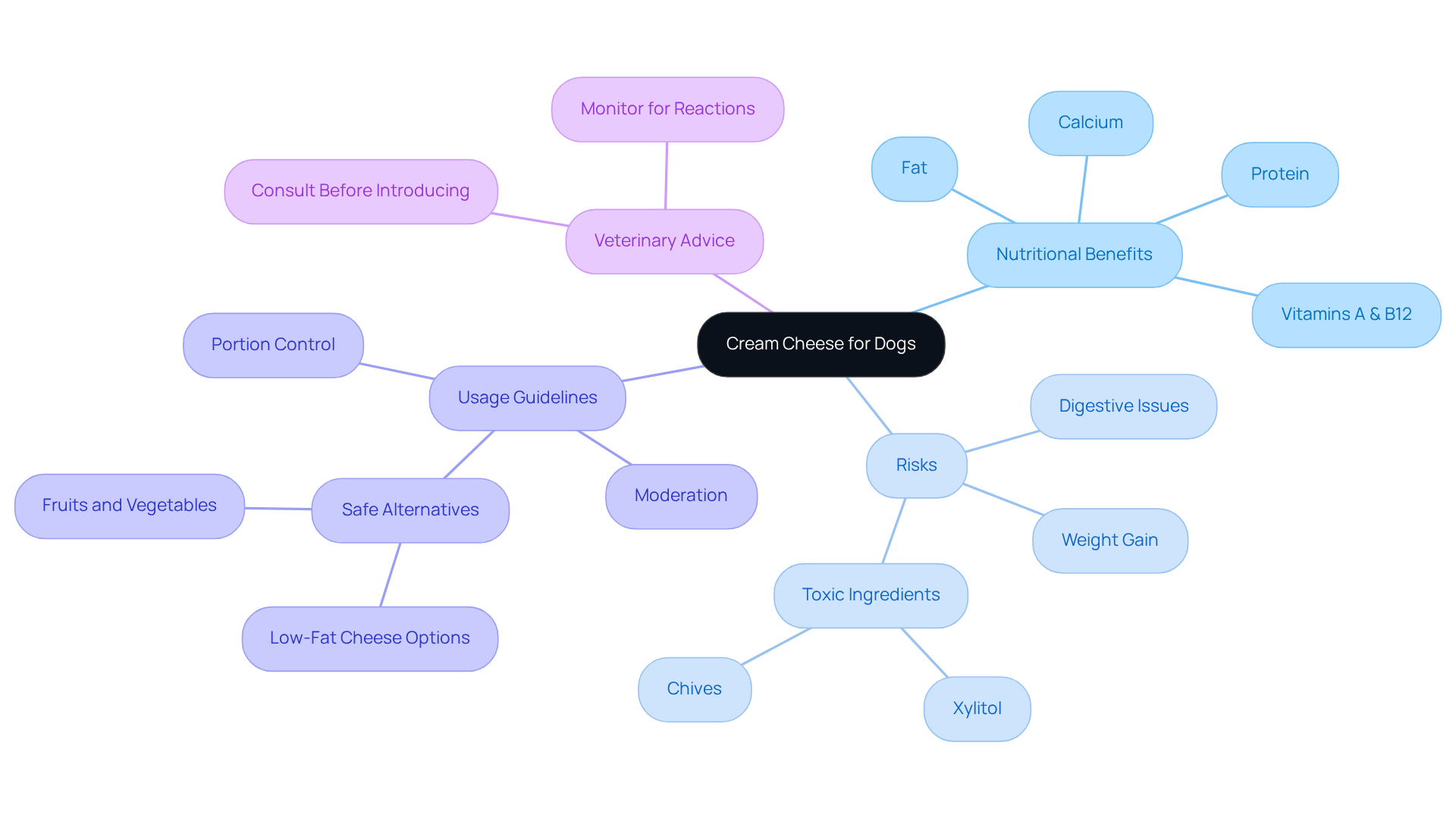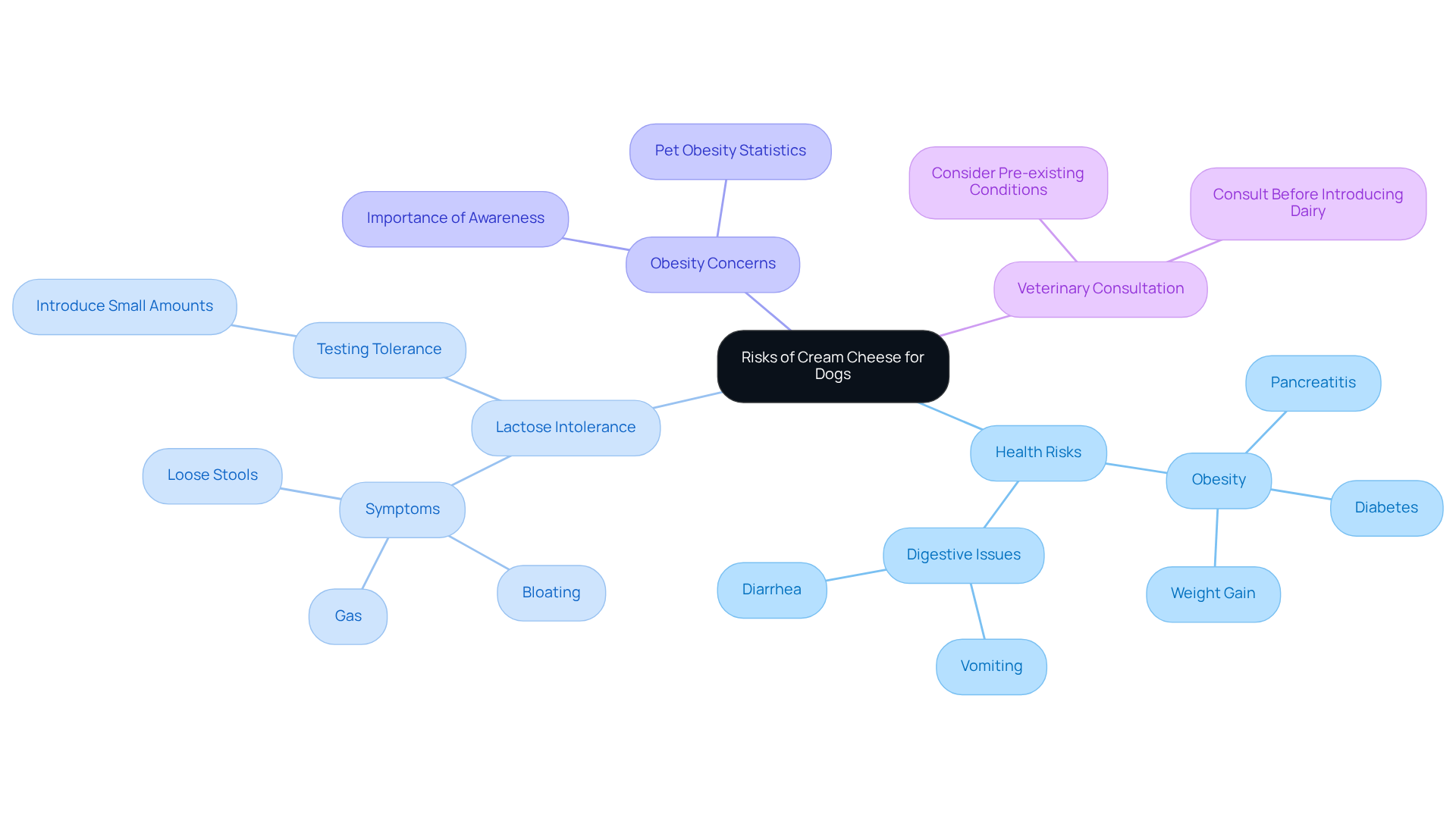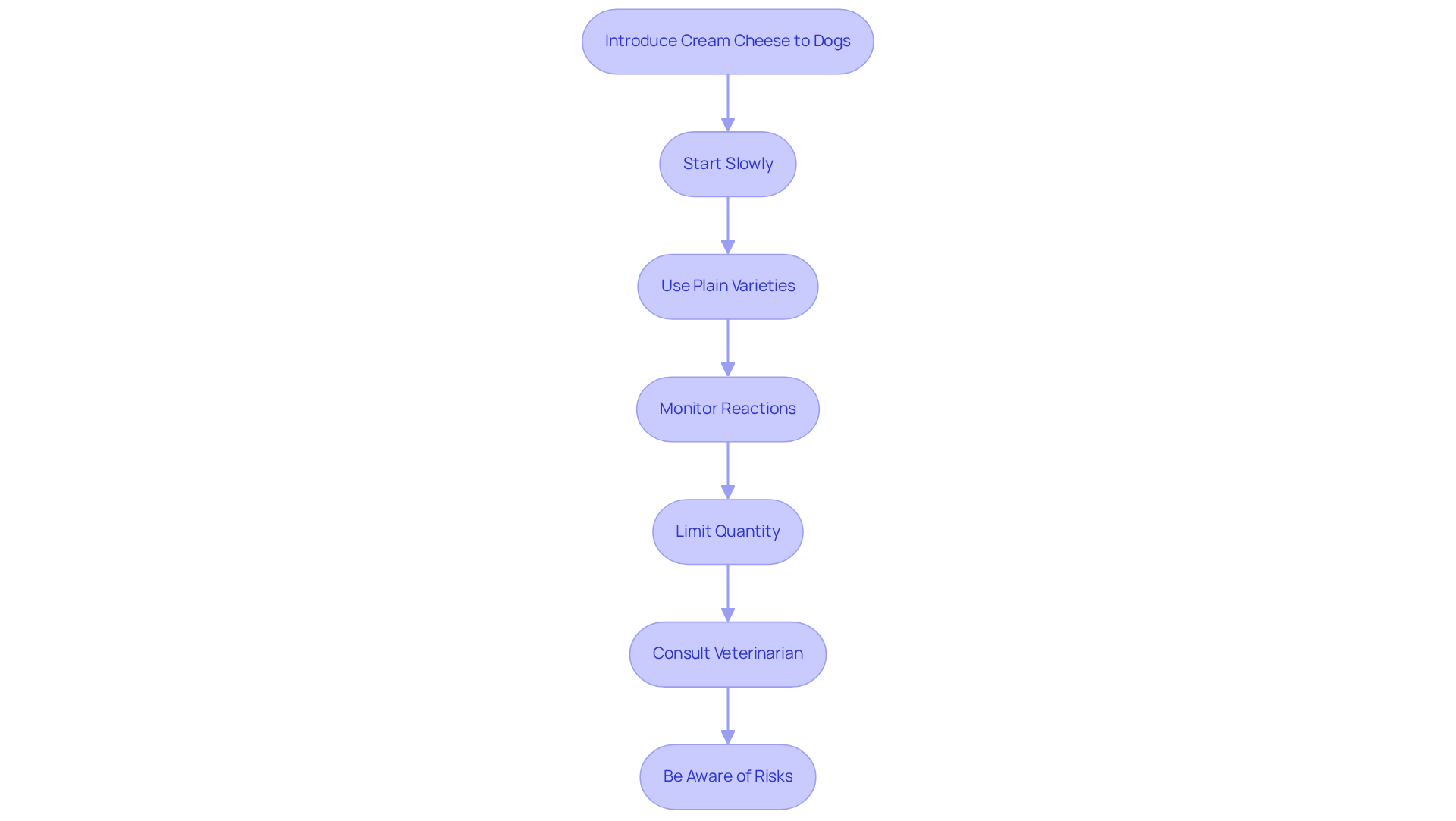Can Dogs Eat Cream Cheese? Understanding Its Benefits and Risks
Overview
As a loving pet owner, you may wonder if your furry family members can enjoy cream cheese. The good news is that, in moderation, dogs can indeed savor this treat! Cream cheese offers some nutritional benefits, including protein, fat, and essential vitamins, making it a delightful option for training or disguising medication.
However, it’s important to consider potential risks, such as:
- Obesity
- Lactose intolerance
- Harmful additives in flavored varieties
We encourage you to consult with your veterinarian before introducing cream cheese into your dog’s diet, ensuring that your beloved pet remains healthy and happy. Remember, your furry companions deserve the best care possible!
Introduction
Cream cheese, with its rich and creamy texture, can be a tempting treat that many pet owners consider for their furry family members. While it offers some nutritional benefits, such as protein and essential fatty acids, the question of whether dogs can safely indulge in this dairy delight is not straightforward.
It’s important to understand the balance between the potential health advantages and the risks associated with cream cheese consumption. Responsible pet owners must navigate these considerations carefully.
What steps can we take to ensure that this indulgent treat enhances a dog’s diet without compromising their health? Let’s explore this together.
Define Cream Cheese: Composition and Characteristics
Creamy spread is a delightful, soft product made from a blend of dairy and milk, perfect for your furry family members. Typically containing around 33% fat, it also includes varying amounts of protein and carbohydrates, making it a versatile addition to your pet’s diet. Its smooth and creamy texture lends itself beautifully to a range of culinary uses, from bagels to desserts, ensuring that mealtime can be a treat for your beloved companions.
Moreover, creamy spread often comes infused with herbs, spices, or fruits, which can change its nutritional profile. Understanding the essential makeup of this dairy spread is vital for pet owners who are curious about whether can dogs eat cream cheese as a reward for their dogs. This knowledge empowers you to evaluate its suitability within your pet’s diet, ensuring that every bite is both enjoyable and nourishing.
At Adventure Den, we believe that caring for your pets means being informed about what they consume. By choosing the right treats, you foster a nurturing environment that promotes their health and happiness. So, take a moment to consider how creamy spread might fit into your dog’s diet and whether can dogs eat cream cheese, giving them the love they deserve with every delicious reward.

Explore Benefits of Cream Cheese for Dogs: Nutritional Value and Uses
When offered in moderation, you may wonder if can dogs eat cream cheese as a wonderful addition to your furry family member’s diet. It contains protein and fat, providing energy and supporting overall health. Particularly, dairy spread includes vital fatty acids, calcium, and vitamins A and B12, which aid in robust bones, healthy skin, and immune function. The creamy texture makes it an appealing treat, perfect for encouraging positive behavior during training sessions or for disguising medications that dogs may be hesitant to take. For instance, blending a little bit of soft dairy product with a tablet can enhance its taste.
However, it’s essential to limit spreadable dairy, and you might wonder, can dogs eat cream cheese, as excessive intake can lead to weight gain and digestive issues. It’s important to note that when discussing the question of can dogs eat cream cheese, certain varieties of spreadable dairy may contain xylitol, which is highly toxic to dogs. Additionally, products with ingredients like chives should be avoided due to their toxicity. Before determining if can dogs eat cream cheese, it is highly recommended to seek guidance from a veterinarian, especially for those with lactose intolerance, pancreatitis, or other specific health issues.
Furthermore, when questioning can dogs eat cream cheese, it’s important to note that dairy spread should constitute no more than 10% of your dog’s daily caloric consumption. By understanding the nutritional value and appropriate usage of cream, pet owners can enhance their pets’ mealtime experience while ensuring their health and well-being. Remember, a little care goes a long way in nurturing your beloved pet.

Assess Risks of Cream Cheese for Dogs: Health Concerns and Dietary Restrictions
While creamy spread can be a tempting treat for your furry family members, it’s essential to ask, can dogs eat cream cheese, and consider the potential hazards involved. With its high-fat content, it poses risks such as obesity and pancreatitis, especially if consumed in large quantities or too often. Unfortunately, pet obesity is a growing concern, leading many dogs to face health issues linked to excess weight. Nicole Paley, Deputy CEO of UK Pet Food, underscores the complexities surrounding pet obesity, highlighting the importance of awareness among pet owners.
Moreover, some dogs may experience lactose intolerance, which can lead to uncomfortable gastrointestinal symptoms like diarrhea and vomiting after consuming dairy products, raising the question of whether can dogs eat cream cheese. Adult dogs generally lack sufficient lactase to digest milk effectively, and puppies are particularly vulnerable to lactose intolerance. It’s also crucial to be wary of flavored dairy spreads, as they might contain harmful ingredients like garlic or onion.
Given these potential health risks, we encourage you to consult with a veterinarian about whether can dogs eat cream cheese before introducing dairy spreads into your dog’s diet, especially if they have pre-existing health conditions or dietary restrictions. Remember, water remains the safest option for keeping your beloved pets hydrated. By taking these steps, you can ensure a nurturing environment for your furry companions.

Implement Guidelines for Safely Feeding Cream Cheese to Dogs: Best Practices
As a loving pet owner, you may wonder if dogs can eat cream cheese and how to safely introduce a dairy spread into your furry family member’s diet. It’s important to approach this gradually. Start by incorporating soft dairy slowly, keeping an eye out for any negative reactions, especially if your dog is new to dairy items. A small quantity—about one teaspoon for small dogs and one tablespoon for larger ones—should make up no more than 10% of your dog’s daily caloric intake.
When selecting a dairy spread, always opt for plain varieties. Avoid those with added flavors or preservatives, particularly harmful ingredients like garlic or onion, which can be dangerous for dogs. Consider using soft dairy spread as a delightful reward during training sessions. Its rich, salty flavor can be quite motivating for your canine companion, making it a wonderful occasional treat rather than a regular part of their diet.
Remember, regular consultations with a veterinarian are essential. They can help ensure that any dietary changes align with your dog’s health and nutritional needs. It’s crucial to be mindful of potential risks, such as weight gain and digestive issues that may arise from cream cheese consumption, particularly when asking if dogs can eat cream cheese. By taking these thoughtful steps, you can create a nurturing environment that supports your pet’s well-being.

Conclusion
Understanding whether dogs can eat cream cheese is essential for every caring pet owner. This creamy delight can offer valuable nutrients and serve as a delightful reward during training, but it’s important to approach it with caution. Be mindful of the fat content, potential lactose intolerance, and harmful ingredients in flavored varieties. By prioritizing moderation and consulting with a veterinarian, you can ensure your furry family members enjoy cream cheese safely.
Cream cheese is rich in:
- Protein
- Calcium
- Vitamins A and B12
All of which contribute positively to your dog’s overall health. However, it’s crucial to limit this dairy product to prevent health issues like obesity and digestive problems. Start with small amounts and choose plain varieties, making sure that cream cheese makes up no more than 10% of your dog’s daily caloric intake.
Ultimately, the decision to include cream cheese in your dog’s diet should be made with thoughtful consideration. By fostering an informed approach to your pets’ nutrition, you can enhance their mealtime experiences while safeguarding their health. Taking the time to understand dietary restrictions and best practices will not only benefit your dogs but also strengthen the bond you share with your beloved companions.
Frequently Asked Questions
What is cream cheese made of?
Cream cheese is a soft spread made from a blend of dairy and milk, typically containing around 33% fat, along with varying amounts of protein and carbohydrates.
What are the characteristics of cream cheese?
Cream cheese has a smooth and creamy texture, making it versatile for various culinary uses, such as on bagels and in desserts.
Can cream cheese be infused with other ingredients?
Yes, cream cheese can be infused with herbs, spices, or fruits, which can alter its nutritional profile.
Is cream cheese suitable for dogs?
Pet owners should evaluate whether cream cheese is suitable for their dogs’ diets, as it can be given as a reward, but moderation is key.
Why is it important for pet owners to understand the composition of cream cheese?
Understanding the composition of cream cheese helps pet owners assess its suitability within their pet’s diet, ensuring that treats are both enjoyable and nourishing.
How can cream cheese contribute to a pet’s diet?
Cream cheese can be a delightful addition to a pet’s diet, offering a tasty reward while also providing nutritional benefits when used appropriately.







